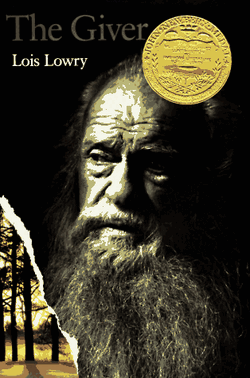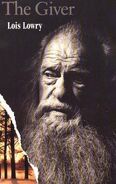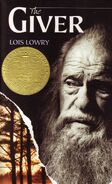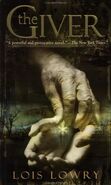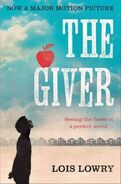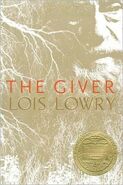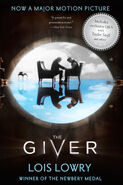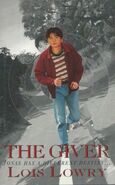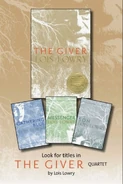(This article is about the novel. For the film adaptation, see this page. For the character, see this page).
The Giver is the first novel in the Giver quartet. It was published in 1993, and proceeds Gathering Blue.
| The Giver | ||
| The Giver | ||
| Author | Lois Lowry | |
| Genre | Science Fiction | |
| Release Date | 1993 | |
| Series | The Giver quartet | |
| Publisher | Laurel Leaf; Reprint edition (September 10, 2002) | |
| Movie Adaptations | August 15, 2014 | |
Synopsis[]
In Lois Lowry’s Newbery Medal–winning classic, twelve-year-old Jonas lives in a seemingly ideal world. Not until he is given his life assignment as the Receiver does he begin to understand the dark secrets behind his fragile community.
Life in the community where Jonas lives is idyllic. Designated birthmothers produce newchildren, who are assigned to appropriate family units. Citizens are assigned their partners and their jobs. No one thinks to ask questions. Everyone obeys. Everyone is the same. Except Jonas.
Not until he is given his life assignment as the Receiver of Memory does he begin to understand the dark, complex secrets behind his fragile community. Gradually Jonas learns that power lies in feelings. But when his own power is put to the test—when he must try to save someone he loves—he may not be ready. Is it too soon? Or too late?
Told with deceptive simplicity, this is the provocative story of a boy who experiences something incredible and undertakes something impossible. In the telling it questions every value we have taken for granted and reexamines our most deeply held beliefs.
The Giver has become one of the most influential novels of our time. Don't miss the powerful companion novels in Lois Lowry's Giver Quartet: Gathering Blue, Messenger, and Son.[1]
Plot[]
Jonas, just like the other Elevens (other children of the age Eleven), is apprehensive about the upcoming Ceremony of Twelve when he and his peers will be given the roles they will hold for the rest of their adult lives in their immaculately organized, tightly run society known as the "Community." In the Community, eccentricities in behavior, appearance, or personality are strongly opposed — even outlawed. However, the rules appear to be readily accepted by all, including Jonas. So it is without real protest that he initially accepts his selection as the Receiver of Memories, a job he is told will be filled with pain and the training for which will isolate him from his family and friends forever.
Yet, under the guidance of the present Receiver, a surprisingly kind man who has the same rare, pale eyes as Jonas, the boy absorbs memories that induce for the first time feelings of true happiness and love. Also, for the first time, Jonas knows what it is to see colors, to feel sunshine or see a rainbow, and to experience snow and the thrill of riding a sled down a hill. But then he is given the painful memories: the wars, the pain, death, loneliness, starvation. These are memories of the Community's deep past. Jonas learns that the Community engineered a society of sameness to protect its people against this past, yet he begins to understand the tremendous loss he and his people have endured by giving their memories away, embracing "sameness" and using "climate control".
Jonas aches with this newfound wisdom and his desire for a life Elsewhere blossoms. But the final blow for Jonas comes when he asks the Receiver (who prefers Jonas to refer to him as "The Giver") what "release" is. The Giver says that he could show him, and allows Jonas to watch a present-day tape of his own father, a seemingly kind and loving man, "releasing" a baby twin by giving him a lethal injection. Like any other "aberration" from sameness, identical twins are against the rules, so the smaller of the two is dispatched like garbage, without the one who conducted the release understanding the true meaning of the action. Together, Jonas and the Giver (who has longed to do so, though Jonas inspired him to proceed) come to the understanding that the time for change is now, that the Community has lost its way and must have its memories returned. The only way to make this happen is if Jonas leaves the Community, at which time the memories he has been given will flood back into the people. Jonas wants the Giver to escape with him, but the Giver refuses, insisting that he will be needed to help the people manage the memories, or they will destroy themselves. The Giver also wants to remain behind so that when his work is done, he can be with a child, his daughter: Rosemary, a girl with pale eyes who ten years earlier had failed in her training to become the new Receiver of Memories and who had asked to be released (she became too overwhelmed with the memories of pain).
The Giver devises a plot in which Jonas will escape to Elsewhere and the Giver will make it appear as if Jonas drowned in the river so that the search for him will be limited. In the meantime, the Giver will give Jonas memories of strength and courage to sustain him and save up his meals as Jonas's food and water supply for his journey. However, their plan is changed when Jonas learns one night that the baby, Gabriel, a "newchild" who has been staying with his family unit because of his failure to thrive "correctly" in the Nurturing Center, will be "released" the following morning. Jonas has become attached to this child — coincidentally, the baby also has the same, rare pale eyes as both Jonas and the Giver, and had been absorbing the memories Jonas received by back rubs each night — and now that Jonas knows the true meaning of "release," he has no choice but to escape as planned but, with Gabriel. And so without the memories of strength and courage promised, and without even a goodbye to the Giver, Jonas steals his father's bike and leaves with the baby to find Elsewhere, an unknown land that exists somewhere beyond the boundaries of the Communities, a place where nobody he knows has ever gone. Their escape ride is fraught with dangers of cold and hunger, as well as search planes, and the two are near death from cold and starvation when they reach the border of what Jonas believes must be Elsewhere, and using his ability to "see beyond," a gift that he does not quite understand, he knows (because of the first memory transmitted to him by The Giver) there is a sled waiting for him when he gets to the top of the hill. He and Gabriel ride the sled down the snowy hill toward a house filled with colored lights and warmth and love and a Christmas tree, and for the first time he hears something he knows must be music. The book ends abruptly and mysteriously here with these final two sentences: "Behind him, across vast distances of space and time, from the place he had left, he thought he heard music too. But perhaps it was only an echo."
Awards[]
- The 1994 Newbery Medal – The John Newbery award (Medal) is given by the Association for Library Serviece to Children. The award is given for the most distinguished contribution to American literature for children.
- The 1994 Regina Medal
- The 1996 William Allen White Award
- American Library Association listings for "Best Book for Young Adults", "ALA Notable Children's Book", and "100 Most Frequently Challenged Books of 1990–2000."
- A Boston Globe-Horn Book Honor Book
- Booklist Editors' Choice
- A School Library Journal Best Book of the Year
Gallery[]
Trivia[]
- Much of the concepts and ideas came from certain moments in Lowry's life.
- The bearded old man on the cover is Carl Nelson, a blind painter.

